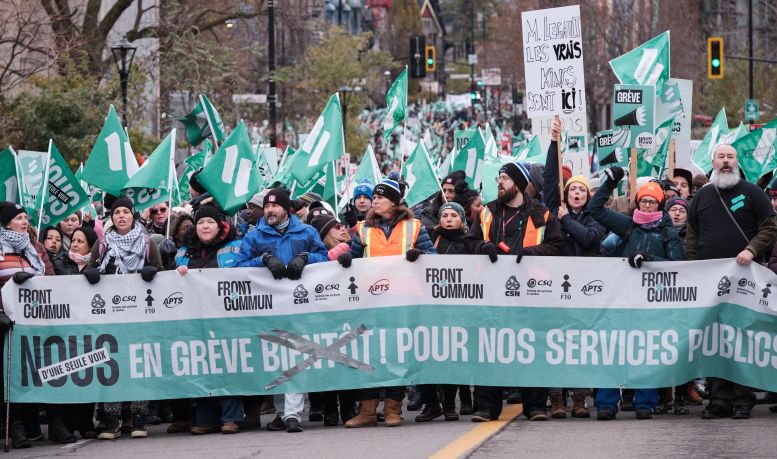Over 500,000 Québec public service workers were on strike on Thursday, November 23. There were huge rallies across the province. This is the latest stage of the workers’ struggle to improve both their pay and conditions and the quality of public services.
On November 6, 420,000 public sector workers in Québec’s Common Front of four unions (CSN, FTQ, APTS, CSQ) held a one-day strike as they campaigned for a new contract. On November 8 and 9, the FIQ, with 80,000 nurses and other health professionals, held their first strike in 25 years.
Between November 21 to 23, the Common Front had three more strike days. On November 23 and 24, FIQ is on strike again. The 65,000 teachers in FAE start an all-out strike on November 23. In total over 566,500 people will be on strike on November 23.
After the first round of strikes, public service workers were enthusiastic and energized. These strikes built on a march of over 100,000 people in Montréal on September 26 for quality public services and a good deal for workers. The Common Front members then voted by 95 percent to strike, up to and including a possible indefinite general strike, the strongest strike mandate since 1983!
The Common Front unites workers in demanding improved conditions to attract and retain workers in education, health care, social services and post-secondary education. It also calls for cost-of-living adjustments (COLA).
The public strongly supports the workers in their struggle with Québec’s CAQ government. A poll this summer shows that 87 percent of Quebecers agree that the government needs to improve public-sector working conditions, 86 percent agree that public-sector salaries should at least be indexed to the cost of living, and 75 percent agree that improved conditions will result in improved public services. In contrast, the CAQ’s popularity and satisfaction ratings are falling across Québec, particularly in its stronghold of the greater Québec City region. The public’s strong support, in contrast to his own, can be a problem for CAQ Premier François Legault.
These public service workers, like millions across the country, have had enough after years of austerity and wages that do not keep up with the cost of living. Working throughout COVID to keep society going while the bosses stayed safe in their offices and raked in the money, has fueled the anger. The mindset of workers is no longer to accept bad pay and conditions; they are mobilized and determined.
The Government has the Money
Last week, the CAQ government of Premier Legault announced funding of around $7 million to bring the Los Angeles Kings to Québec City for two exhibition hockey games. The Montréal Canadiens offered to play for no cost!
It also reduced the cost of driver’s licenses for another year, resulting in $600 million in lost government revenue.
The National Assembly in May passed Legault’s government’s bill to give MNAs a minimum of $30,000-a-year pay increase. They are now the highest paid politicians in any province! Premier François Legault’s income increases $208,200 to $270,120 a year. Yet, its pay offer to workers would cut real wages by 6.1 percent by 2027.
These announcements show the contempt the CAQ places on public services and its workers. The Finance Minister’s economic update confirms that the CAQ intends to stand firm on austerity. The Québec state is deliberately depriving itself of the fiscal room to maintain viable public services and provide adequate working conditions.
A Prolonged Struggle Ahead
Faced with the complete refusal of the employers to seriously address low pay, unions have no choice but to increase the pressure and attack the CAQ where it hurts: on the economic front. Gone are the days when unions could think of “convincing the CAQ” of the legitimacy of their demands. This may be a long struggle, but if properly organized, victory can be won.
The struggle of the workers at the 26 government-run cannabis stores (SQDC) who are members of the FTQ provides a glimpse of what it takes to win against this type of government. After an 18-month indefinite strike, the longest strike in the history of state-owned companies in Québec, the agreement reached goes beyond the original demands and grants amnesty for its members targeted by repressive legal measures.
Some CAQ tactics
Given the strength of the unions and the public support, Legault may well think twice before indulging in a swift, authoritarian decree. The CAQ has several options to try and break the movement. As with the SQDC, it can let the conflict fester in the hope that strikers will give up. A strike is a sacrifice in terms of energy, time and money. The calculation would be to let the cold bite the strikers and the strike funds run dry. If members don’t understand the strategy needed to win, impatience can undermine solidarity on the ground. The CAQ is betting that unions don’t have the capacity to motivate and politicize their members.
The CAQ also hopes that the usual media bludgeoning will eventually take its toll. Columnists will continue to spew their venom, blaming strikers for the consequences of the strike rather than the intransigence of the government that created the crisis. These people are paid to erode solidarity between different sectors of the working class (“they’re taking us hostage!”) and to break people’s trust in the unions.
In any case, strategic thinking to resist the government must start now. It has to happen on the ground, at a grassroots level, during this week’s pickets.
Already there are some cynical comments, such as “We’re negotiating, but it’s not going anywhere.” “We’ll strike, but they’ll decree it.” The unions’ activists need to respond to these remarks and keep the union members motivated. History isn’t written in advance. Every CAQ strategy has its weaknesses. If the workers hold firm and set society ablaze, history will be the story of successful determination.
Build the Strikes’ Momentum
This week’s strikes are important for getting the government to move. In the event of an impasse at the bargaining table, which is likely, the tactical question of calling a third round of strike days or an all-out strike will arise in all union organizations.
Failure to escalate runs the risk of demotivation and cynicism. Conversely, launching an all-out strike without preparation runs the risk of depleting strikers’ morale and strength.
In anticipation of a protracted struggle, union locals should start discussing and planning now for an all-out strike, the timing and duration of which will be decided by rank-and-file members. It starts with organizing picket lines that generate enthusiasm and fill the need for food, toilets, heat sources and babysitting. Planning the political animation of sign-making and banner-making workshops, and speaking at picket lines, are essential for the future.
Faced with a stubborn government, it’s impossible to win by remaining within the legality of picket lines. Strike day actions must have a concrete impact on the government and the capitalist interests it protects. Winning requires the full might of the unions.
Strikes, Blockades and Occupations
Building the workers’ power means disrupting the profits of private companies, like those that support the CAQ. Above all, it means including the whole community in the struggle of public service employees. Everyone who benefits from public services is a potential activist. If, for example, the CAQ prefers to put taxpayers’ money in the pockets of multinational battery companies, block that project until public sector workers win.
Union action and mobilization committees can start thinking about and preparing for economic disruption actions involving as many people as possible. Visits to picket lines by other strikers, the networking of strike committees and coalition work with combative social forces — such as student associations — are important to achieve this.
Helping Each Other to Fight Better
Exchanging ideas on the best tactics and strategies for pressure provides the opportunities to find original ways of getting around the limits to the right to strike imposed by the Essential Services Act.
Why not link with other people’s pressure tactics? Block or occupy companies that pollute, are heavily subsidized or supply arms to Israel? Why not paralyze executive parking lots, block strategic roads or railroads (with due respect for emergency situations)?
If broad sections of society get involved in this strike movement, it could force Legault to make concessions to the striking public sector, and perhaps even precipitate an election. An all-out strike of over half a million workers could become a political strike that could rid Québec workers of the CAQ government.
Public service workers are full of confidence. They will need to pressure their union leaders to stand their ground and to continue escalating actions until the unions win their claims — unlike the leaders of Ontario’s CUPE and BC’s GEU who settled for weak deals. COLA for over 500,000 workers and a rebuilding of public services would be a huge victory and show to all of Canada’s working class what a determined struggle of unionized workers can win.
The momentum behind the Common Front is a historic opportunity for the labour movement in Québec and the rest of Canada! It has the potential to start reversing the decades-long erosion of public services, and to end teacher shortages and endless wait times in emergency wards.
Politicize the Struggle for Victory
With the CAQ bogging down negotiations and choosing to invest in everything but public services, workers have no choice but to take the fight to renew their collective agreements into the political arena.
The CAQ wants to divide union forces and prevent solidarity with the population. To counter this means building the power of workers to fight the power of the capitalists and their governments over living and working environments.
To achieve a victory may require attacking the profits and ownership of private companies behind the policies of austerity, privatization and cutting of public services. The active support of private sector workers is essential.
Through this process, the union struggle can become politicized, transcending strictly economic or sectoral issues and asking the question: “Who runs society and in whose interest?”
If the battle for free, quality public services is to be victorious, workers have to fight to get rid of the CAQ. The 2012 student strike showed, however, that changing one neoliberal government for another wasn’t enough.
The public sector’s fight isn’t just against the CAQ. It’s a struggle for the working class to gain the political power to guarantee the best health care, education and social services, free and accessible to everyone. It’s a struggle to replace a system that must sabotage the services of the majority to maximize the profits of a minority. It’s a socialist struggle.



